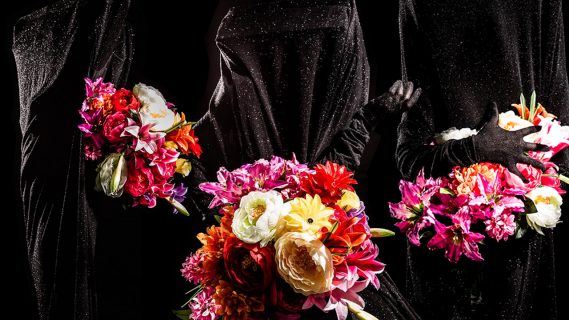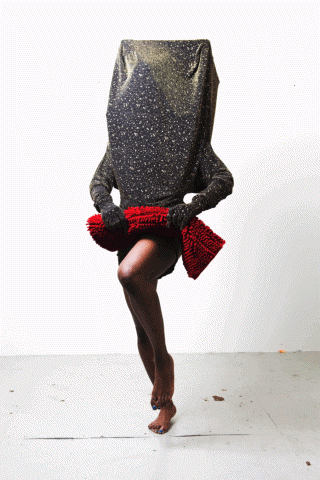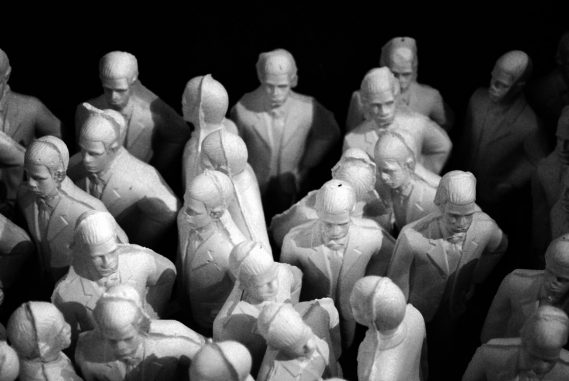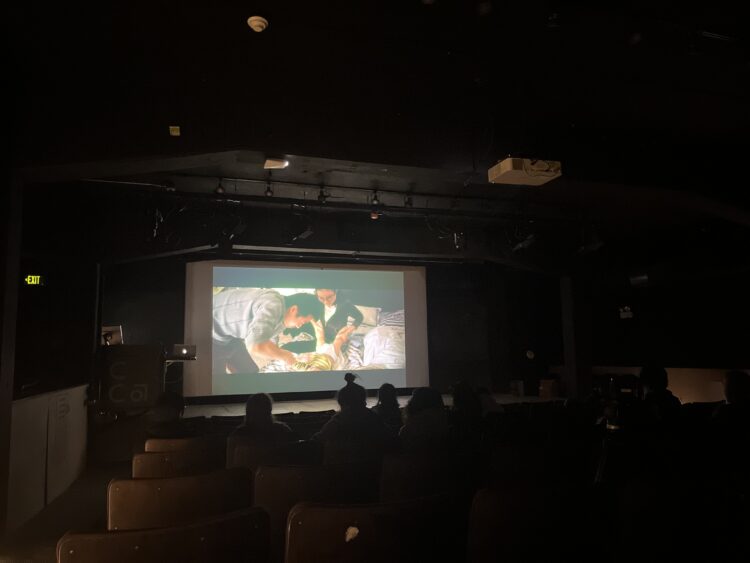Kenya (Robinson) Challenges the Imagination to Remold Privilege

If Kenya (Robinson) has a superpower, it would be to say more in the span of a minute than most people say in an hour. Recently, her podcast collaborative art work with artist Doreen Garner, was described in the New Yorker as ranging from “intensive critique to self-help strategies to playful slander to free-association wordplay, and back again.” Kenya’s Creative Capital project, CHEEKY LaSHAE: Karaoke Universal, likewise, promises no shortage of material. Inspired by the way karaoke allows the audience to become the performer and vice versa, CHEEKY LaSHAE—Kenya’s avatar that can be embodied by a revolving cast of characters—presents Karaoke Universal as a course where the students can become the professor. In an upcoming iteration, called Privilege as Plastic Material, the six-part course will be offered at Pioneer Works starting Feb 21 to March 28. She will also host a podcast ST4NKLOV3 at the Creative Capital offices March 23.

CHEEKY LaSHAE by Kenya (Robinson)
Hillary Bonhomme and Alex Teplitzky sat down with Kenya to understand more about the project.
Alex Teplitzky: Ok, so the Privilege as Plastic Material course at Pioneer Works is coming up. What is it?
Kenya (Robinson): I knew when Barack Obama first got elected as president of the United States that part of my tears that came had to do with joy. That was like, 15%. And then 85% was shame because I didn’t think it was going to happen at all. I was like, “wait a minute. That’s dangerous because that has to do with my imagination.” That is something I can nurture. In spite of anything else that might be happening in our world, I can imagine things. And especially as an artist, you have to nurture that muscle.
Once I got into art school and started interacting with other artists, I became familiar with this term, “the plastic arts.” The plastic arts has the attributes of plastic in that it can exist in different forms, it has flexibilty, but it can be treated to be rigid, it can be reconstituted, it can do a lot of different things. So, I was like, I need something as—at least what’s been taught to us—as fundamentally oppressive as privilege, I need to think of that with a lot more flexibility and imagination: it’s got to be able to change forms. Like I say all the time, it can’t be the exclusive property of whiteness, everybody should be able to access and utilize it. If you are alive and have an opportunity to exist as a human being, that’s a huge privilege. You can create memories, you can think about the past, you can imagine the future, you can even find ways to engage in the present. But it’s all about this kind of stretching and pulling and snapping back. The only other place I felt that was when I was making objects and sculpture.
So, that’s where the concept originally came from and it’s continued to evolve as I’ve been both metaphoric about what plastic is, and quite literal with the materials that I use. Right now I’m using some liquid plastic, plastic bags, the plastic vortex that’s in the Pacific Ocean, and what plastic means in terms of this kind of helpful yet harmful durability. All of that seems to connect with this exploration of how we can change some of the things that feel like our oppressive mechanisms.
Alex: One of my favorite quotes of yours lately is from an interview where you talk about a moment where you realized artist Andrea Fraser consistently cried during one of her presentations. You were disgusted by it at first, but later used this performativity as inspiration, in a way, not just for your artistic practice, but for your everyday life, like when you used the act of performative crying to dispute a cell phone bill. I loved how you made artistic practice expand seamlessly into an everyday activity. So my question is how do you take this concept you came across, privilege as plastic material, and develop it into this six-week course?
Kenya: There would be those moments where [snaps] I’d get it, and I would try to recall the moments of that experience that led me to that place. It could be anything, like, I just picked up this book today, The Gamblers Anatomy by Jonathan Lethem. The back of the book says, “What if you were clairvoyant, but it didn’t make a difference?” I thought, that concept certainly is going to find its way into the course.
After the election, a lot of black people were like, “we told you this fifty ‘leven times. White people are crazy!” I saw folks walking around shell-shocked. So what do you do, if that is, in fact, part of your of process of living? What if you have very clear intuition, knowledge and experience and it may not affect your present circumstances in any identifiable way? What do you do about that?
There’s every reason for me not to be an artist because, like, this is some bullshit… You’re broke all the time, you’re always like, “Come on! Look over here. Help!” [laughs]. So you have to figure out a way to manage the process so that, in itself, is fulfilling. I think most artists do that, but this is how I accomplish it.
Hillary: I really like that. It’s also interesting that you feel like a lot of other artists do it because that’s applicable to any situation. I feel like non-artists struggle with it more.
Kenya: I watched this documentary with Noam Chomsky, and he said somethhing to the effect of how so many people have taken their best skills and put it towards the financial industry, and not science or art or philosophy or medicine, or horticulture… There’s a lot of pressure. I don’t think that folks are just like, “I’m going to get ALL the money.” There’s so much pressure just to be able to exist that it can be a little distracting.
But everything gets better with practice. These are just tools that anybody can use. As an artist, I’m fortunate. I’ve been exposed and supported by some great institutions, but I’m greedy, so I want more people. I want more people to have an opinion, to love it or hate it, to be like, “psh, dat girl, man?” Whatever possibility of response. I want to know and experience those possibilities in a direct way. Whatever’s floating out there.
Alex: CHEEKY LaSHAE’s practice is Karaoke Universal—your Creative Capital project. In this iteration, you have described it as this course, which people are going to take. It strikes me as a perfect platform, because, as opposed to a performance, you can ask questions, you have a final project, you do homework…
Kenya: Yes!
Alex: You’re taking home what you learned and coming back the next week. So there’s this interesting connection to karaoke, where you study the songs, you workshop them at home, then you come out with your version of Whitney Houston. And then there’s this back and forth between the professor and the student, right?
Kenya: It’s very much a symbiotic relationship. I feel like I’ve learned so much from my students in every scenario that I’ve been an educator—from college to preschoolers. Preschoolers are wild [laughs]. I like to wear jumpsuits and overalls and stuff, especially when I’m working. So the preschoolers are like, “Why do you have that on? That’s not grown-up clothes.”

Kenya (Robinson)’s #WHITEMANINMYPOCKET Dave sculptures
Hillary: Can you talk about your experience in school and how that influenced the process to make CHEEKY a teacher.
Kenya: For sure. I’ve always enjoyed being the student. Whether I was the stellar student or the one that was just “meh.” I mean, like, I failed typing. Failed. FAILED. Anyway. And now I write a lot and now I’m like, “Damn it! I wish I knew how to type.” [laughs]
In my house, learning was something that happened all the time. I grew up in the age of encyclopedias: we had two sets, a globe, maps, a microscope, a chemistry set, and cross stitch. If there was something I wanted to investigate, my mom would be like, “OK, I know where we can get that.” And there that also would be that questioning: “What are you going to do after that?” Now that you know this, what happens next? That encouragment to keep going was key.
Both my parents at various phases in my life have been educators. My mom ended up working for Alachua county, and she would help young mothers get ready for their babies. I know she really liked that. She had a group of clients that gave her joy. My dad always wanted to be a teacher. One of his heroes was his math teacher, Mr. Hightower, but in the same vein of what we were talking about earlier, he realized he couldn’t support a family doing that. So he served in the military for twenty-something years. After that he got support to get a Master’s degree in education to teach.
He really was committed to teaching. One time we were walking through Penn Station, and all you could hear, was “MR. ROB!” It was one of his students who was a dancer here in New York. This beautiful young man. My father taught middle school, and he had grown up to become a performer. It was amazing to see how he had affected this student such that he was like a celebrity now.
Alex: We had this panel about mass incarceration, and one of the artists was talking about the greatest dangers of using artistic practice to address these issues is encouraging the audience to feel good about doing nothing. They see the art installation and feel horrible, but after that kind of check out. So with this course, the medium is, by nature, more engaging.
Kenya: It just keeps coming out like that. I’ve been studying mass incarceration when I stumbled into a grad-level class on accident. That was in 1999 before the conversation really got started around that topic. Being from Florida though, the spectre is always there. I hate to say it, but it wasn’t like it was surprising about Trayvon [Martin], but it was surprising because of the moment, because of the reaction, because of… [points to her smart phone], you know?
So my response now, instead of just making something, I’ll create a tool for engagement. I had this idea to make a Dungeons & Dragons game. When you go to so many of these panels, which I’ve been to, you see a lot of black and brown people. You see a couple of white folks who are helping to put it on, and then, there’s not anything beyond that. So I started thinking, a lot of these Dungeons & Dragons-heads have money, they have influence. What if I could get them to play “John Henry and the Patchwork Penitentiaries?” Maybe that would change something in their framework. D&D players can understand things like, the COs [Correctional Officers] as an Ogre class, but it’s hard for them to understand that as a reality in the criminal justice system. Like, what if they could understand baby mamas as sprites—they have a whole economy, they have spells.
Those statistics are very real in my world. I have a cousin who is just coming out of the prison system after three years. Two of my boyfriends have been in some phase of the correctional system, one for eight, another for two. And it’s not like they were really that different from me, so I had that connection. There’s got to be a way of revealing the connections, for other people, that are already there. It’s like teaching preschoolers: you have to trick them into attention. We don’t change that much from when we are two and a half or three. I’ve seen it!
Alex: Whenever I used to play Bomberman in high school, I started seeing visual imagery from Bomberman in the sidewalk, the buildings, in everything around me. So you’re like, if I made a game, I could help people see how mass incarceration affects everything around them.
Kenya: The Dungeons & Dragons game: it’s a whole world. When you play consistently it becomes difficult to compartmentalize as separate from an actual, lived experience. The question is how to work that imagination. That’s one of the things on which I challenge myself the most strongly. People often say, “I can’t imagine what it’s like to be in so-in-so’s shoes.” If there’s one thing that human beings have, it’s actually imagination. A lot of amazing qualities like empathy, sympathy, compassion and generosity are nurtured by imagination. You can imagine things. Nobody is asking anyone to replicate other people’s situations, but to get a sense of them—truly, fully—we all have that capacity. That’s why art is important.
Alex: It’s hard to imagine what art really is for anymore without it being affected by, a response to, or resistance against the current political situations. Hillary and I were talking about the Super Bowl, and she said watching it reminded her of simpler times.
Kenya: Lady Gaga was flying through the air! But it’ll never be Michael Jackson! He just kept popping up here and there. I was like “mama, did he just…?”
Alex: Exactly! It takes you back to that time when you were a kid and you saw Michael Jackson on the halftime show. And as a kid you paid very little attention to politics.
Kenya: I did get a chance to see the game. It’s interesting, the entertainment value of sports. It’s many layers of entertainment that go into it. CHEEKY wants to continue to develop Karaoke Universal as a class, as a workshop, as a module, as a motivational speech, etc. One of the things that CHEEKY definitely wants to do is speak at corporate events, and other corporate events that are masquerading as sports teams. Everybody’s got their own agenda and how they work in concert, everything is hierarchy and corporatized, but there’s also emotions involved.
Alex: You talk about performance so freely. There’s performance on a stage, but performance is everywhere. When I talk to my boss, for instance, I’m performing a different character than when I talk to my friends.
Kenya: It’s so hard because we all get taught that it’s important to speak our minds, be respectful, don’t be a doormat. But it’s so nuanced, it’s so much more than it appears because of the issues that we’re facing that people are more engaging with now. I don’t like to say “race”—but the relationship between black people and white people. That’s a model for these other interactions. Or gender. How we are allowed to present ourselves in the world based on gender is so nuanced.
Class. That’s got me buggin! I’m trying to enter these worlds that are so class’ed. When you talk about “fine art”—that’s elitist. That’s what it is. And I am not that. But I use a lot of the tools and rely on access to those resources, whether it’s travel or even buying a book. I’ve taught reading classes to second graders and they don’t even have books in their homes.
Or health care. My dad was volunteering at a school in my hometown Gainesville, Florida, and he told me, “You know what, Kenya? There are no kids with glasses in the whole school.” Blows your mind, right? I’ve been wearing glasses since I was nine years old, and Jennifer Bates wore glasses, I can name all the kids in my school that wore glasses. You know there’s a lot of kids in that school that need glasses.
Alex: If you don’t get glasses, then you miss out on everything else.
Kenya: And it’s probably painful. When I didn’t have glasses I would get headaches. Then you get crabby, and that could affect the way you interact with your fellow students, your teachers. There are all these things that go into how nuanced privilege is.
Sign up for Kenya (Robinson)’s Privilege as Plastic Material at Pioneer Works happening Tuesdays 7-9pm, Feb 21 – Mar 28, here.
